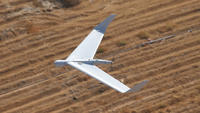-
Rayguns to be used in L.A. prisons
Officials at the Los Angeles County Jail have announced that the U.S. jails will deploy a new laser weapon to break up fights among jail inmates; the raygun, capable of producing a beam of up to 100 ft, will be positioned on the detention center’s ceiling and operated by using a computer monitor and a joystick
-
-
New smell sensor uses genetically engineered frog eggs
Researchers use genetically engineered frog cells to develop a sensor that detects gasses; the researchers embedded the sensor into a mannequin, so that it could shake its head when a gas was detected, making it easier to observe
-
-
Businesses cope with Mexico security risks, pass costs to consumers
Faced with the threat of smuggling attempts by criminal organizations in Mexico, foreign companies are simply doing more, spending more, and in the process charging consumers more to shore up security in a country where killings, kidnappings, and extortions have become a part of daily life
-
-
Report: Israel "planning strike on Hezbollah sites in Syria"
Kuwaiti daily quotes unnamed Western sources to say that Israel has bolstered its military presence in the Golan and stepped up UAV, balloon overflights, in preparation for an attack on Hezbollah’s weapons storage facilities in Syria; since the 2006 war with Israel, Hezbollah has been storing its more valuable rockets and missiles in facilities in Syria, figuring that Israel would think long and hard before attacking military storage facilities in Syria, even if these facilities are used to store Hezbollah’s armaments; if an Israeli attack takes place, it should be seen as part of the preparations for an Israeli attack on Iran’s nuclear weapons facilities: in case of such an attack, Hezbollah would be instructed by Iran to launch the organization’s weapons against Israel, so Israel has an interest in weakening the organization’s military capabilities
-
-
Shape-shifting UAV for maritime search and rescue missions
Use of morphing flight surfaces has enabled the development of a shape-shifting UAV that can operate in extreme weather conditions; cutting-edge avionics ensure a smooth flight for extended rescue and surveillance missions, while reducing risks to material and crews
-
-
New illegal immigration frontier: the sea

There is a new frontier for illegal immigrants entering the United States — a roughly 400-square-mile ocean expanse that stretches from a bullring on the shores of Tijuana, Mexico, to suburban Los Angeles; in growing numbers, migrants are gambling their lives at sea as land crossings become even more arduous and likely to end in arrest; while only a small fraction of border arrests are at sea; authorities say heightened enforcement on land, and a bigger fence are making the offshore route more attractive
-
-
Money smuggling across border grows despite increased enforcement
U.S. and Mexican law enforcement authorities only seize about 1 percent of cash from drug trafficking, despite increased efforts by both countries; stemming the flow of cash is vital to efforts by the United States and Mexico to take down drug cartels, as drug cartels depend on cash from wholesale drug sales to gangs in the United States
-
-
Unmanned copter to deliver supplies to troops in forward positions
The U.S. military will award Lockheed Martin a contract to build an unmanned helicopter which will deliver supplies to forward-positioned troops; in trials earlier this year, a prototype has shown that it can shift 3,000lb of cargo across 150 nautical miles in two flights within six hours — all without any input from ground operators other than specifying the destination and route
-
-
Unmanned helicopter enters restricted airspace after losing communication
An MQ-8 Fire Scout lost communication with its operators and flew into restricted airspace around Washington, D.C.; typically during a lost communications event, an autonomous vehicle is preprogrammed based on its last waypoint to conduct certain activities, take a holding pattern, and wait for operators to reconnect; the Pentagon says: “We found a software anomaly that allowed aircraft not to follow its preprogrammed flight procedures”
-
-
Mexico deploys Israeli UAVs in war on drug cartels

Since December 2006, nearly 30,000 Mexicans have been killed in that country’s increasingly vicious drug war; the relentless flow of guns from the United States into Mexico has significantly strengthened the drug cartels, allowing them not only to withstand the efforts by the Mexican authorities to impose law and order, but in many cases to take the operational initiative, making large swaths of the country ungovernable; the Mexican government, for its part, is bolstering its own capabilities: last year it has secretly purchased surveillance UAVs from Israel to perform monitoring tasks in border areas and near strategic installations in the country
-
-
Skeletal scans could be newest screening technique
The adult skeleton has 206 bones; size, shape, density, and joint structure make each skeleton slightly different; throw in an extra lumbar vertebrae or extra rib — which some people have — as well as previously broken bones, implants, screws, and other identifying characteristics, and the signatures become even more individual
-
-
Railroads do not let HAZMAT teams know what is on train

Lethal chemicals roll through the backyards of cities and towns without the knowledge of these towns; residents; railroads do not share information about the schedule and contents of HAZMAT cargo with these towns’ emergency services, so the services cannot prepare for catastrophe; if chlorine or ammonia were to escape from a punctured tanker — in an accident or derailment — it would form a toxic cloud; a compromised 90-ton rail car of chlorine could create a plume fifteen miles long by five miles wide; the U.S. railroad industry transported some 75,000 tank cars of toxic inhalants nationwide in 2009
-
-
Biggest mass graves linked to drug-related violence uncovered in Mexico
Seventy-two bodies found in a mass grave on a ranch in northern Mexico; in recent months an increasing number of mass graves have been discovered; in June, police recovered fifty-five bodies from an abandoned mine near Taxco, in Guerrerro state
-
-
Sector Report for Tuesday, 24 August 2010: Emergency / Police / Mil.
This report contains the following stories.
Plus 1 additional story.
-
-
Hagerstown PD disappears from analog scanners
Those wishing to listen in on Hagerstown Police Department calls will have to update their technology: the “patch” to the old 800 MHz frequency, which allowed simulcasting of calls on the old analog frequencies, was taken down last week
-
More headlines
The long view
Why Was Pacific Northwest Home to So Many Serial Killers?
Ted Bundy, Gary Ridgway, George Russell, Israel Keyes, and Robert Lee Yates were serial killers who grew up in the Pacific Northwest in the shadow of smelters which spewed plumes of lead, arsenic, and cadmium into the air. As a young man, Charles Manson spent ten years at a nearby prison, where lead has seeped into the soil. The idea of a correlation between early exposure to lead and higher crime rates is not new. Fraser doesn’t explicitly support the lead-crime hypothesis, but in a nimble, haunting narrative, she argues that the connections between an unfettered pollution and violent crime warrant scrutiny.
Bookshelf: Smartphones Shape War in Hyperconnected World
The smartphone is helping to shape the conduct and representation of contemporary war. A new book argues that as an operative device, the smartphone is now “being used as a central weapon of war.”
